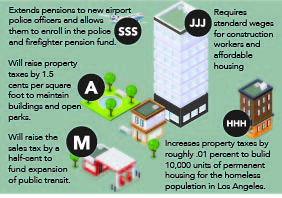Los Angeles voters pass new measures
Along with choosing the nation’s next president, L.A. voters made important decisions about several issues important to the local community including homelessness, transportation and jobs on Election Day. Five out of the seven city and county measures on the ballot were approved: Measures A, M, HHH, JJJ and SSS.
Measure M will raise the sales tax by a half-cent in order to fund the expansion of public transit in Los Angeles. Jeffrey Sellers, an associate professor of political science and public policy, explained that while prices will go up slightly in the short term, the long-term goal of the measure is to bring public transit to underserved communities.
“All goods in stores, with a few exceptions like food and other essentials, will be a little more expensive for students and everyone else,” Sellers said. “The specific improvements in the plan include a lot of incremental measures that have been carefully distributed geographically around the region to make the case that every neighborhood received something.”
M’s long-term plan is to make improvements to highway infrastructure in addition to building and creating more rapid bus transit in the Los Angeles area. The goal is to increase the usage of public transportation in the city. Plans include a subway beneath Wilshire Boulevard and from Simi Valley to LAX. M will also enhance bike transportation in the city.
“In our area of central L.A., the improvements include bike paths along the L.A. River from downtown and a 3.8 mile streetcar line in the downtown business district,” Sellers said. “Commuters to the Downtown area will benefit from a variety of express lanes, regional rail and new Metro extensions.”
Jessica Yu, a senior studying policy, planning and development, said that although M will reduce LA traffic, there is a possibility that many current communities might be displaced.
“With the onset of heavy development in these transit areas, M could rapidly drive up housing prices and force current residents there to move,” Yu said. “I think that developers and city and county leaders need to not only be aware of this, but also address it and find a way to prevent pushing out any communities as much as possible.”
Measure HHH increases property taxes by roughly .01 percent to build 10,000 units of permanent housing for the homeless population in Los Angeles. These housing units are meant to include on-site assistance through social workers and mental health counselors.
Jennifer Ailshire, an assistant professor at the USC Leonard Davis school of Gerontology, said that HHH provides the necessary resources for homeless individuals to permanently live off of the streets.
“Efforts to combat homelessness need to be focused not just on getting people into housing but getting them into permanent affordable housing so the risk of becoming homeless again is minimized,” Ailshire said. “We need a more permanent path out of homelessness if we are to have any hope for reducing homelessness in L.A. and HHH provides both the vision and funding to accomplish this.”
Benjamin Henwood, an assistant professor at the USC Suzanne Dworak-Peck School of Social Work, said that HHH was imperative in addressing the concern that L.A. residents have about the visibility of homelessness.
“The county has been tracking the number of homeless individuals that would need to get housed in order to end homelessness and get to zero,” Henwood said. “HHH, in my mind, was a necessary measure if we seriously want to have a chance at addressing and ending homelessness.”
Henwood said that HHH also has challenges, as building permanent supportive housing will take time and agreement with many Los Angeles communities.
“The pushback from communities and the concern of ‘Is this building going to go in my neighborhood near my house?’ and the ‘not in my backyard’ issues I think are going to play out over and over again now that this is passed,” Henwood said.
Henwood added that HHH will require a lot of work to be put into effect.
“It’s great that it is passed and there will be an opportunity to do a lot quickly, but in order for those 10,000 to come online it’s gonna take time and it’s gonna take public persuasion,” Henwood said.
Some strategies are to convert existing motels into permanent support housing.”
Moreover, Henwood said that getting the people into the permanent supportive housing is only a portion of the battle.
“The issue is whether we have enough trained people to coordinate care and provide care,” Henwood said. “That should be talked about now. What we’re trying to do at the social work school is get people interested in this type of work so that we can develop graduates who want to work with this population, have the skills to work with this population and understand all the work that needs to be done.”
Measure JJJ, also known as Build Better LA, is an initiative requiring standard wages for construction workers and affordable housing. The measure, which was sponsored by labor unions and affordable housing developers, won the support of nearly 64 percent of L.A. voters. JJJ requires developers to assign a percentage of units in new apartment and condominium residential buildings for low-income tenants.
County Measure A will raise property taxes by 1.5 cents per square foot to pay and maintain buildings and open parks. Over 70 percent of L.A. voters approved this measure.
Measure SSS extends pensions to new airport police officers and allows them to enroll in the police and firefighter pension fund.

